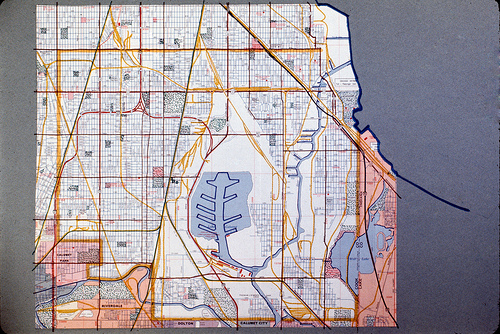The commercial strip along Michigan Avenue in Roseland, on Chicago’s far South Side, is supposedly going through a major renovation, but residents have yet to see any changes.
The area, known as the Roseland-Michigan Avenue tax increment financing (TIF) district, was designated for redevelopment in 2002. Under the proposal, construction is supposed to go until 2025.
Despite the designation, however, residents interviewed in Roseland last month said they have seen few improvements in their neighborhood, which has been called the second most crime-ridden area in Chicago following Englewood.
The plan calls for new retail stores and mixed-income housing in a 176-acre area along Michigan Avenue. The area is bordered by 100th Street on the north to 120th Street on the south, and from Wentworth Avenue on the west to Indiana Avenue on the east.
Typically, when an area is identified a TIF, taxes collected there are used for redevelopment.
Ahmad Bajwa, owner of City Sports, said the TIF is a good idea, but he said he hasn’t seen any progress in Roseland.
“I’ve been here 18 years, and I haven’t seen much here,” Bajwa said. “It’s been more regression than it has been progression.”
Bajwa said some residents oppose the TIF, fearing they will be displaced.
While studying Roseland for the TIF plan, researchers found that 86 percent of the buildings in the area are deteriorating. There are 252 vacant lots in the neighborhood. Also, 26 percent of the properties are tax delinquent. In 2004, the area had a total equalized assessed valuation of $28 million, which is supposed to increase to $91 million by 2025 – the last year of the TIF.
According to AreaVibes.com, Roseland has an unemployment rate of 17.6 percent. Data from the website show 10 percent of the residents of the neighborhood work in wholesale or retail stores.
Lamont Smith, 27, a sales associate at Snyx Gallery, said TIF should provide more opportunities for youth employment in an effort to reduce crime.
“They need to open up the field house and host basketball open gyms. We have the park, but it’s not safe at night. More programs will help keep the crimes down,” Smith said.
The crime in Roseland plays a pivotal role in the development of the commercial areas along Michigan Avenue. Due to recurring violence, many stores close at 7 p.m., and the business areas are deserted.
According to everyblockchicago.com, a website that tracks crime, Roseland reported 116 crimes during a recent one-week period. Many of these crimes were violent, including assault, armed battery, street fighting and other crimes. Lincoln Park recorded only 10 crimes during the same period, and most of these crimes were thefts and burglaries, according to everyblockchicago.com.
CPD officer Jamal Pearson, 47, has worked Roseland for 11 years and said he understands the danger of Roseland in evening hours.
“You’ll be wanting to watch yourself in this area, especially after dark,” Pearson said. “It’s not a good idea at all to go out on the back streets or side streets after dark. There are a lot of drugs sold down here, lot of gangs, and they’re very active. This is one of the worst areas in the city, and walking around at night is really dangerous.”
Drug dealing is the main activity of the gangs in Roseland, according to eHow, a website that researches areas of Chicago.
The area has seen a steep decline in its population, according to the federal Census Bureau. It lost 15 percent of its population between 2000 and 2010, dropping from around 52,000 residents to about 44,000.
Roseland was founded in 1849, according to the Encyclopedia of Chicago. It drew its name from the many flower gardens planted by the Dutch families who settled in the area and created homes and stores, which later became Michigan Avenue.
The neighborhood has drastically changed over the course of decades, according to the Encyclopedia of Chicago. Once predominately Caucasian, the area is now 98 percent African American. Roseland streets are known as the “The Wild 100s” because of its violence and crime.
Many residents said the commercial strip along Michigan Avenue in Roseland is vital to the community and plays a big role in the everyday lives of the people of the neighborhood.
“The shopping center is the lifeline of the community,” Bajwa said. “Without the stores, the people would just wander off into other areas.”
Residents said they are also worried about the planned closure of the South Red Line El train from Cermak/Chinatown to 95th Street in Roseland. The line will be closed for five months while track is being replaced.
When trains are not running, shops in Roseland will be very important to residents because transportation to stores outside the area will become more limited, some said.
“A lot of these people can’t travel to downtown Chicago to those stores so, in a way, this is all they have,” Smith said. “The strip means a lot to the people. If the strip is gone, it’s going to take a piece of them away.”













Be First to Comment